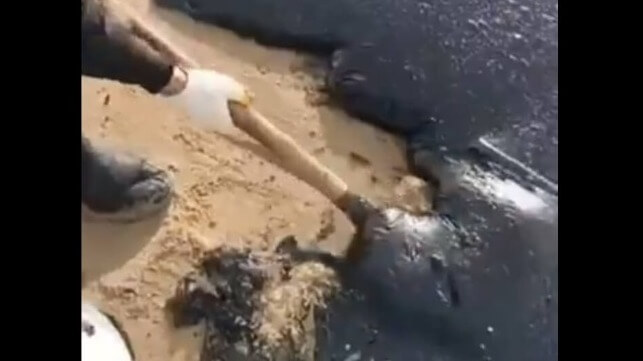ECOCIDE
Video: Storm Scatters Bags of Oily Waste From Spill Cleanup in Russia

The bunker-fuel cleanup in the Kerch Strait region encountered a setback over the Christmas holidays: renewed stormy weather, combined with slow or inadequate removal of bagged waste. The efforts of countless volunteers went to waste when wave action tore open collected bags and scattered their contents across the waterfront near Anapa, according to Russian social media reports.
On December 15, the 50-year-old Russian tanker Volgoneft 212 broke up near the Kerch Strait, spilling an unknown quantity of the Russian bunker fuel known as "mazut." The vessel had 4,300 tonnes of the product aboard at the time of the casualty, according to Russian media. At about the same time, the tanker Volgoneft 239 ran aground and gradually broke up. The total estimated volume of spilled fuel oil amounts to 3,700 tonnes, according to Russian authorities.
Much of the pollution has washed ashore in Krasnodar, near Anapa. Russia has declared a state of emergency, and government personnel and volunteers have collected a reported 1,700 tonnes of oily sand to date.
However, volunteers for the beach cleanup have reported limited heavy equipment support to help remove the results of their labor, and bags of oiled sand accumulated along the beachfront. This week, another heavy storm blew through the region and scattered torn-open bags along the waterfront.
Even where it has been collected, the bagged waste has not always been properly disposed of, according to some residents. Videos posted to Russian social media appear to show excavators attempting to bury the bagged waste in the middle of the beach, instead of inshore where it would be away from wave action.
"Well, they praise us, like, great volunteers. We didn't come here to clean up fuel oil manually for their praise, we breathe in toxic fumes. We do this to save nature at least a little. In the end, they [officials] lie that 'everything is fine, there is enough of everything,' and because of their misinformation, the collected fuel oil is not removed on time," one frustrated Russian volunteer told Radio Free Europe. "Some of the bags were carried out to sea, turned upside down, some were washed back to the shore."
Multiple strandings and deaths of threatened Azov dolphins have also been reported, along with thousands of oiled birds. Due to a shift in wind direction, fuel contamination is now drifting towards the Crimean side of the Kerch Strait and may soon wash ashore in the Feodosia area.
"The discharge of fuel oil on our beaches threatens a greater disaster than for Anapa. The local sand is looser with a high shell content, its consistency is much softer and more porous than in the Anapa area," an environmental activist in Feodosia told Radio Free Europe's Crimean service. "Volunteers have already found birds injured by fuel oil in some places on our beaches."
Despite the vessel casualties and concerns about safety, the Volgoneft tanker fleet continues to trade in the Kerch region.
Russian Region Declares Emergency After Black Sea Oil Tanker Collision
The Krasnodar region in southwest Russia has declared a regional emergency as oil continued to wash ashore this week following the collision of oil tankers in the Black Sea last week.
Last week, the Volgoneft 212 and Volgoneft 239 tankers sustained serious damage as a result of a storm in the Black Sea, running aground in the Kerch Strait. The Volgoneft 212 spilt in half. According to reports of the disaster, the two tankers were carrying some 4,300 deadweight tonnes of crude oil each.
Both of the tankers that got damaged in the storm were more than 50 years old, Reuters noted in a report on the news, citing TASS, the Russian state news agency. A third tanker has reported it has been damaged after the two other oil carriers spilled oil in the Black Sea. The third tanker is from the same generation of vessels, Reuters reported, citing a certificate it had seen.
A week after the incidents, the region of Krasnodar declared a state of emergency.
“Unfortunately, oil products continue to wash up on the beaches in Krasnodar,” the region’s governor Veniamin Kondratyev said in a post on Telegram on Wednesday.
Initially, scientists expected that most of the oil spilled from the tankers would remain at the bottom of the Black Sea, allowing it to be collected in the water, Kondratyev added.
However, due to the warmer weather, the oil products surfaced to the top and washed ashore, the governor said.
Until Wednesday, the emergency situation was at the municipal level only, but now the state of emergency is being extended to the entire region of Krasnodar, Kondratyev said.
Many analysts and insurers have been warning that an environmental disaster is waiting to happen with the old tankers that Russia has been forced to use to carry its crude oil and refined products abroad amid increasingly tighter Western sanctions.
By Tsvetana Paraskova for Oilprice.com

No comments:
Post a Comment